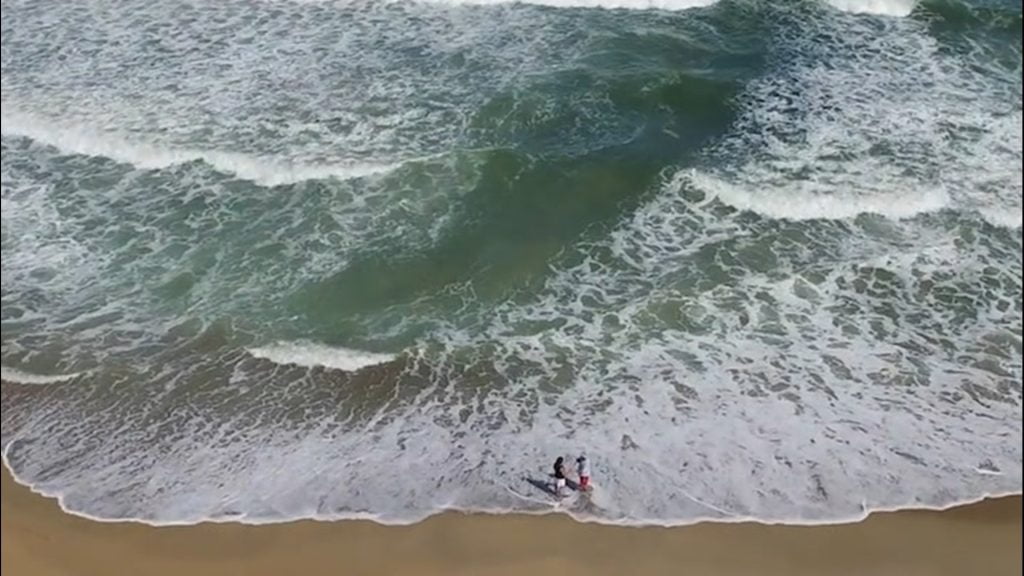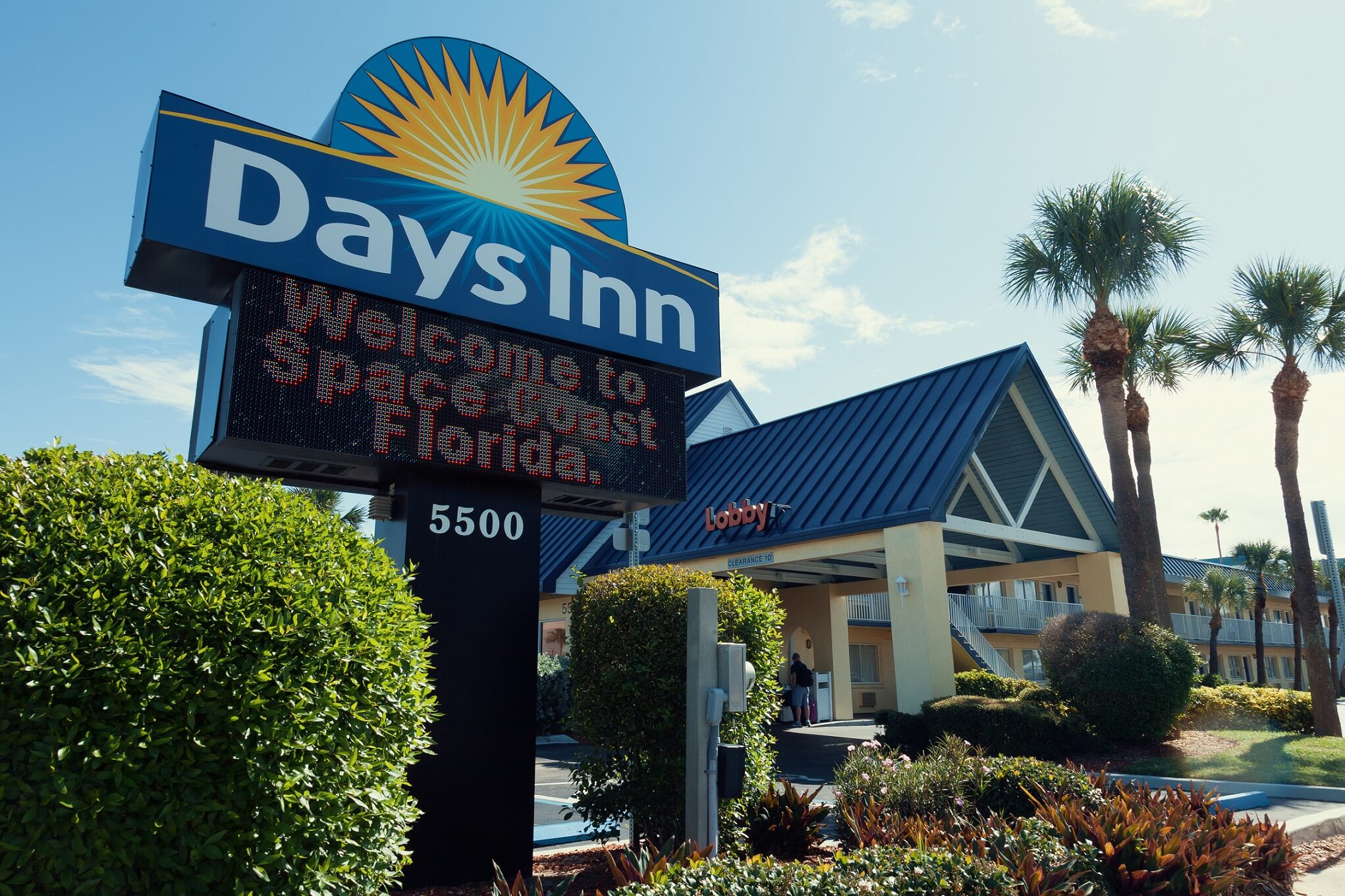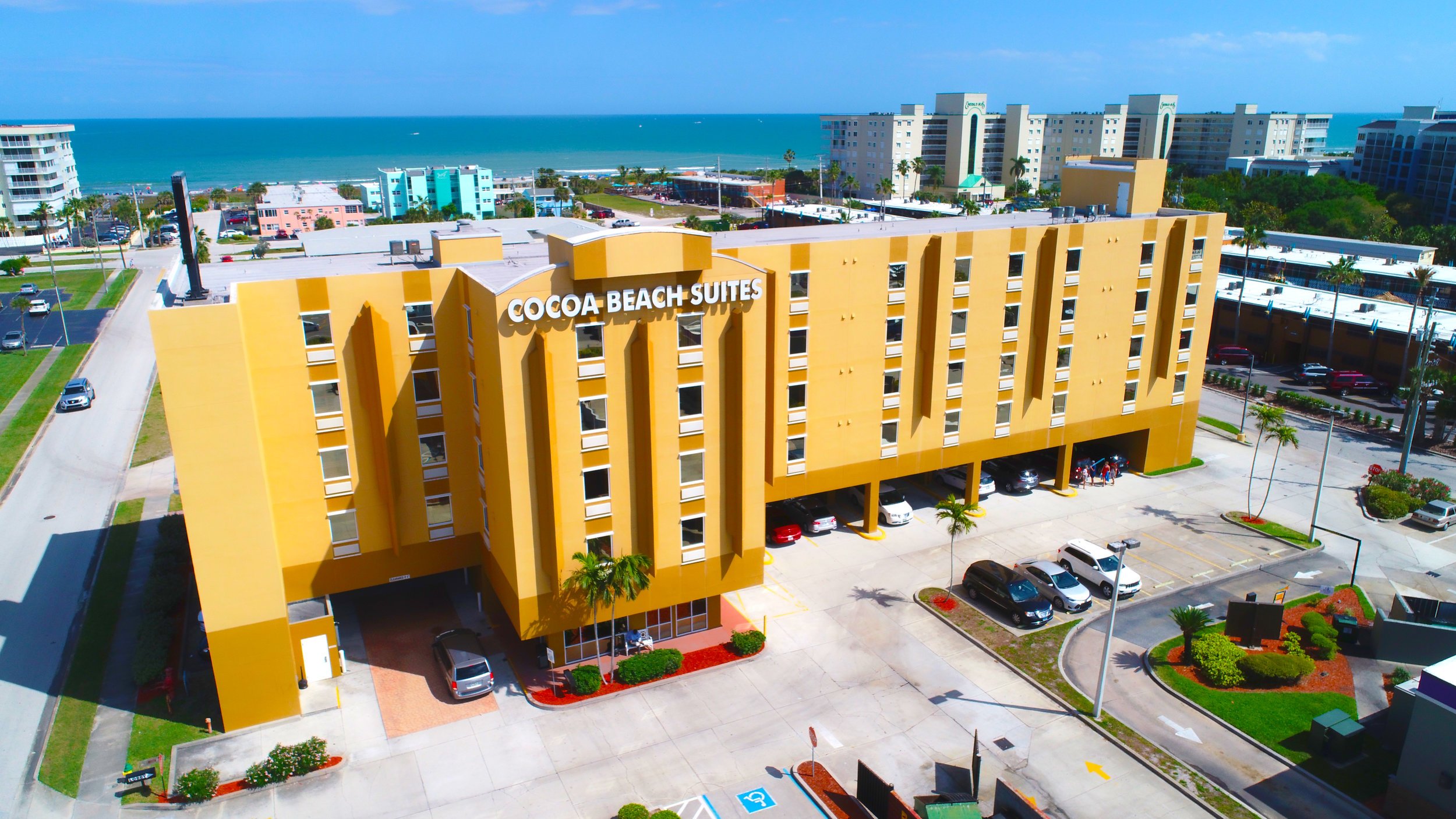While our beaches are known for welcoming and smooth waves, their complexion may change from time to time, especially during and after storms. This change can come in the form of undertows and rip currents which may be hard to determine for the casual beachgoer. Therefore, to keep our local population and visitors safe and informed, we offer the following information for anyone spending time on our beaches.
Our recent storms in Florida changed the ocean floor shifting sand and sediment, causing the sandbars to shift. Sandbars naturally help dissipate wave energy; however, the sandbars have been wiped clear in many areas.
What is a Rip Current?
- Rip currents are extremely powerful, narrow channels of water that move much faster than an average current. They are commonly found on the East Coast, Gulf, and West Coasts of the U.S.
- Rip currents can move faster than a professional swimmer at up to eight feet per second.
- Panicked swimmers often try to counter a rip current by swimming straight back to shore, putting themselves at risk of drowning because of fatigue.
- Lifeguards rescue tens of thousands of people from rip currents in the U.S. every year, but it is estimated that 100 people are killed by rip currents annually. If caught in a rip current, don’t fight it! Swim parallel to the shore and swim back to land at an angle.
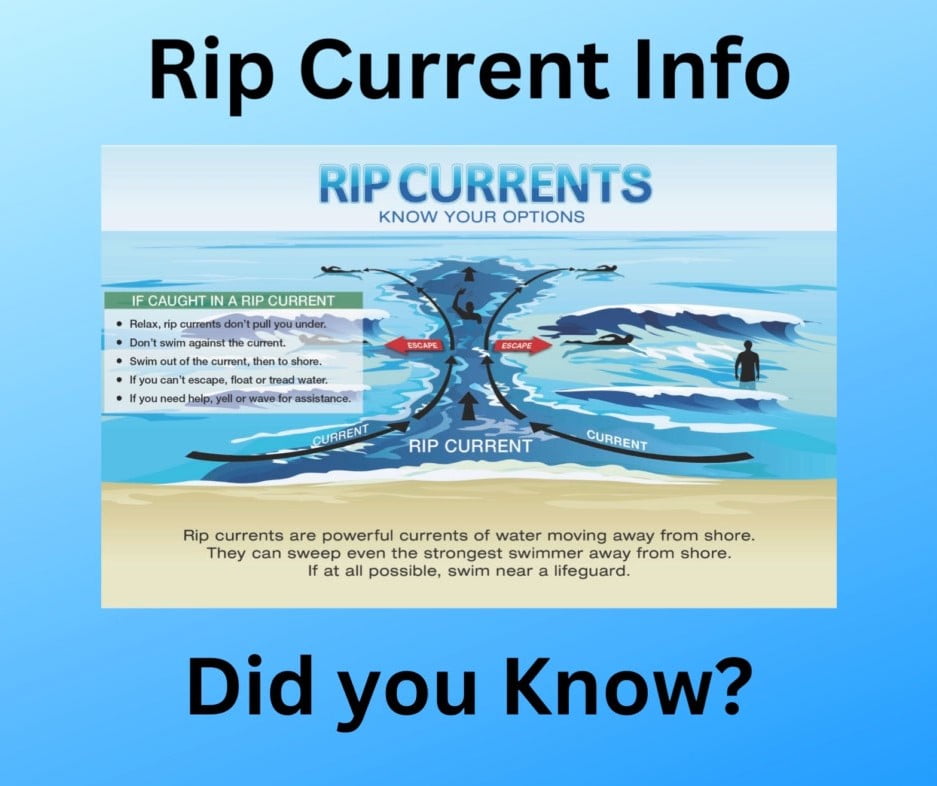
If Caught In A Rip Current…
- Relax; rip currents don’t pull you under.
- Don’t swim against the current.
- Swim out of the current, then to shore.
- If you can’t escape, float or tread water.
- If you need help, yell or wave for assistance.
Rip currents are powerful currents of water moving away from shore. They can sweep even the strongest swimmer away from shore. If at all possible, swim near a lifeguard.
Rip currents are fast-flowing channels of water that extend from close to the shoreline through the surf and past the breaking waves.
Did you know that the strength from the pull of a rip current can reach speeds faster than an Olympic swimmer?
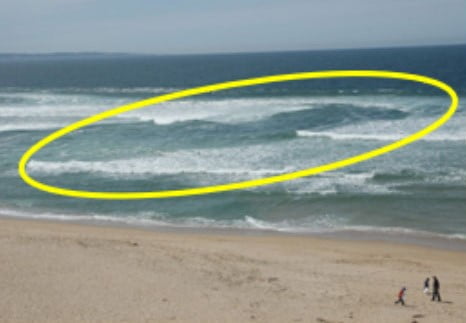
Rip Current Tips
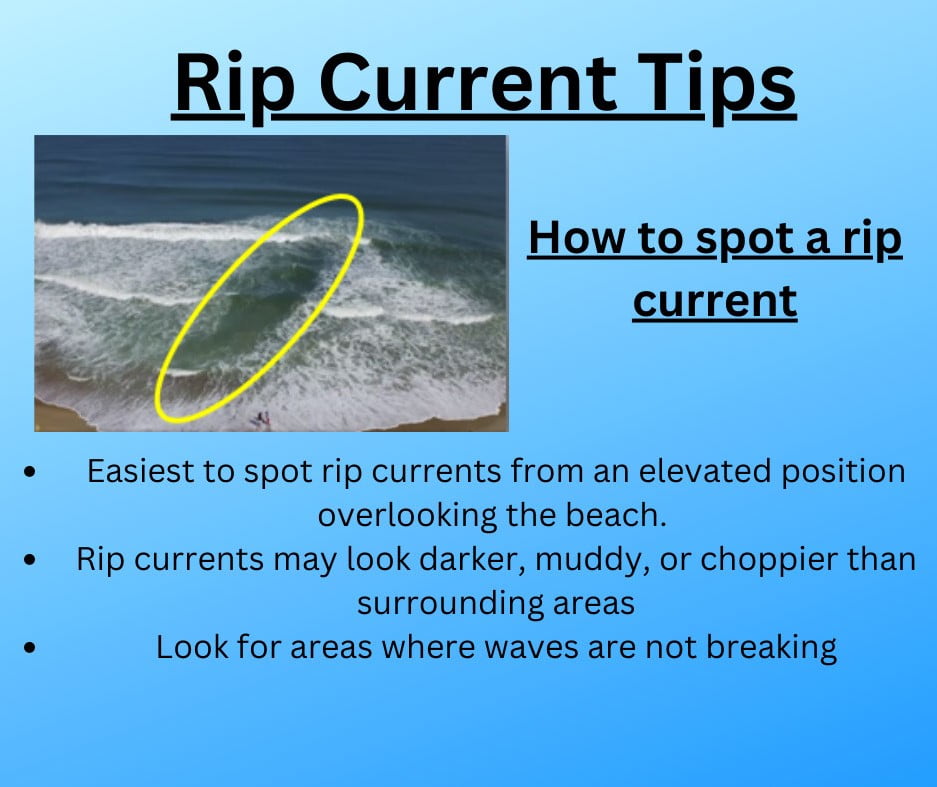
- The easiest to spot rip currents from an elevated position overlooking the beach.
- Rip currents may look darker, muddy, or choppier than surrounding areas.
- Look for areas where waves are not breaking.
- Rip currents on the East Coast are common, and we must be aware and alert.
- Know your environment before you go into the water.
Facts About Rip Currents
- Rip current speeds will vary. Average speeds are 1-2 feet per second, but they have been measured as fast as 8 feet per second.
- Rip currents can be very narrow or more than 50 yards wide.
- Sometimes a rip current ends just beyond the line of breaking waves; others may continue to flow hundreds of yards offshore.
- Rip currents do not pull people under the water; they pull people away from the shore.
- Rip currents are sometimes mistakenly called undertow or riptide, but these terms are incorrect. Only the term rip currents are technically correct.
- Waves and currents are strong and can knock you off of your feet.
- Rip Current environments are hazardous and can turn into trouble quickly and without warning.
Rip Current Safety Tips
- Know how to swim
- Never swim alone
- If in doubt, don’t go out
- Swim near a lifeguard
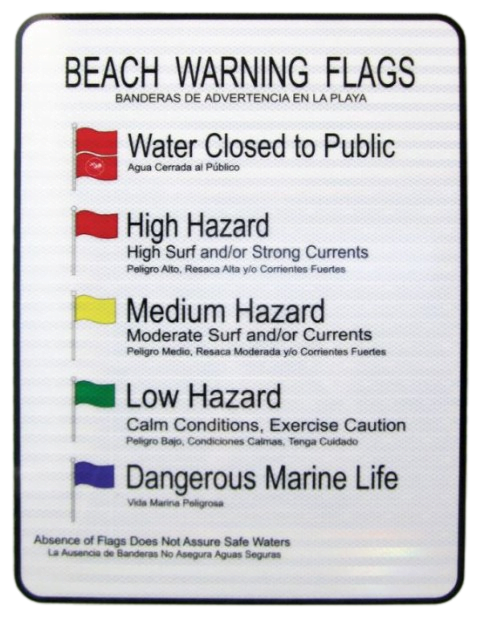
United States Lifesaving Association that the chance of death by drowning at a beach protected by lifeguards is 1 in 18 million.
Where to Get More Information About Rip Currents
- Before you leave for the beach, check the latest National Weather Service forecast for local beach conditions.
- When you arrive at the beach, ask lifeguards about rip currents and other hazards.
- More information about rip currents can be found at weather.gov or usla.org.
Cocoa Beach Lifeguard Locations
- Cocoa Beach Pier
- Shepard Park
- Lori Wilson Park
- Minuteman Causeway
- Tulip Avenue
- Murkshe Park
- Fischer Park (Seasonal)
Cape Canaveral Lifeguard Locations
- Jetty Park (Closest to Port Canaveral)
- Cheri Down Park
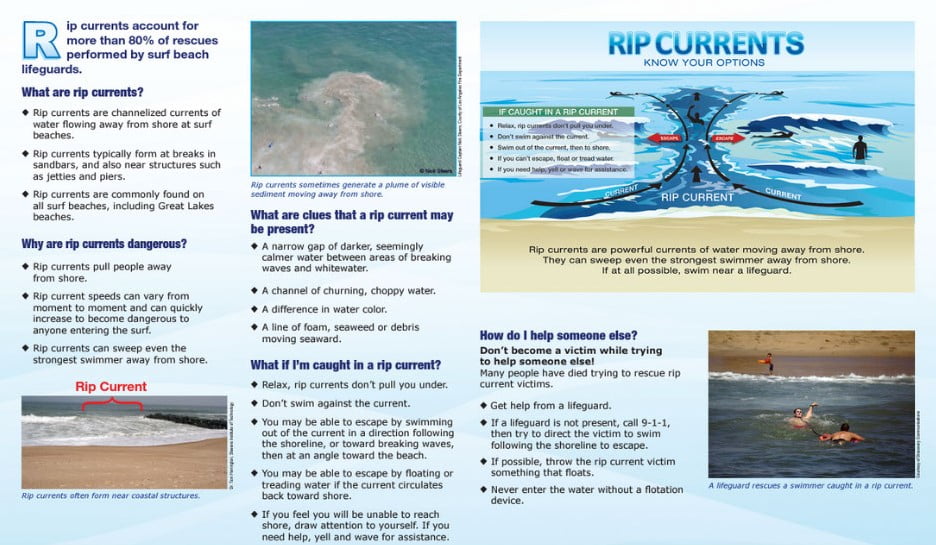
Rip Current Frequently Asked Questions(FAQ)
Rip currents account for more than 80% of the rescues performed by surf beach lifeguards.
What Are Rip Currents?
- Rip currents are channelized currents of water flowing away from shore at surf beaches.
- Typically rip currents form at breaks in sandbars and near structures such as jetties and piers.
- Rip currents are commonly found on all surf beaches.
Why Are Rip Currents Dangerous?
- Rip currents pull people away from shore.
- Rip current speeds can vary from moment to moment and quickly increase to become dangerous to anyone entering the surf.
- Rip currents can sweep even the strongest swimmer away from shore.
What Are Clues That a Rip Current May be Present?
- A narrow gap of darker, seemingly calmer water between areas of breaking waves and whitewater.
- A Channel of churning, choppy water.
- A Difference in watercolor.
- A line of foam, seaweed, or debris moving seaweed.
What if I’m caught in a Rip Current?
- Relax. Rip currents don’t pull you under.
- Don’t swim against the current.
- You may be able to escape by swimming out of the current in a direction following the shoreline or toward breaking waves, then at an angle toward the beach.
- You may be able to escape by floating or treading water if the current is circulating back toward shore.
- If you feel unable to reach shore, draw attention to yourself. If you need help, yell and wave for assistance.
How Do I Help Someone Else?
- Don’t become a victim while trying to help someone else! Many people have died trying to rescue rip-current victims.
- Get help from a lifeguard.
- If a lifeguard is not present, call 911, and try to direct the victim to swim following the shoreline to escape.
- If possible, throw the rip current victim something that floats.
- Never enter the water without a floatation device.
Special thank you to the City of Cocoa Beach for sharing these graphs and information.

